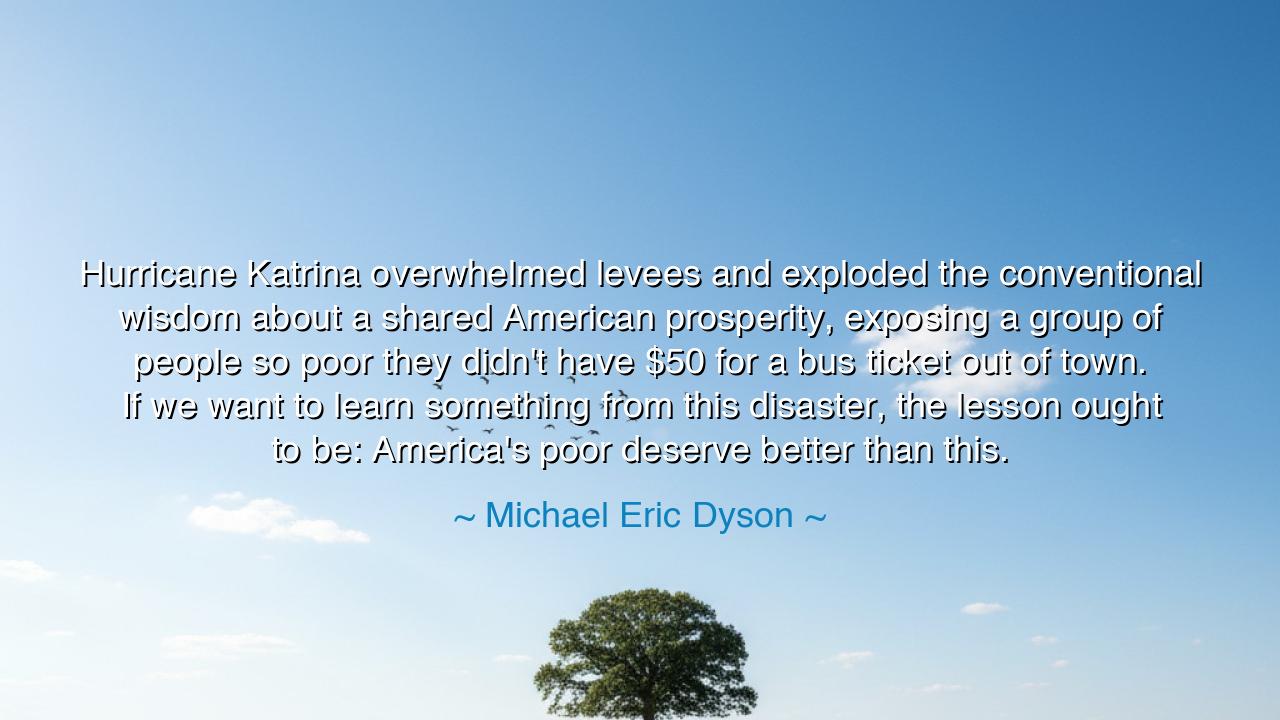
Hurricane Katrina overwhelmed levees and exploded the
Hurricane Katrina overwhelmed levees and exploded the conventional wisdom about a shared American prosperity, exposing a group of people so poor they didn't have $50 for a bus ticket out of town. If we want to learn something from this disaster, the lesson ought to be: America's poor deserve better than this.






The scholar and prophet Michael Eric Dyson spoke with sorrow and fire when he declared: “Hurricane Katrina overwhelmed levees and exploded the conventional wisdom about a shared American prosperity, exposing a group of people so poor they didn’t have $50 for a bus ticket out of town. If we want to learn something from this disaster, the lesson ought to be: America’s poor deserve better than this.” In these words he tears away the veil of illusion, revealing that beneath the banner of shared prosperity lay millions forgotten, abandoned in the hour of greatest need. The storm did not only break the levees of New Orleans; it shattered the myth of equality in the world’s richest nation.
The origin of this truth lies in the tragedy of Hurricane Katrina in 2005, when waters rose and a city drowned. The winds howled, but louder still was the silence of aid, delayed and inadequate. Those with means fled by car or plane, but countless others—poor, black, elderly—were left stranded on rooftops, in the Superdome, or swept away entirely. Dyson calls us to see in this disaster not merely nature’s wrath, but the deep fissures of poverty and neglect that the floodwaters unveiled.
History offers another echo in the story of the Irish Potato Famine of the nineteenth century. The blight destroyed crops, but it was not famine alone that killed—it was the indifference of the powerful. Food was exported while the poor starved; aid was slow and insufficient. Like Katrina, it revealed that disasters do not strike equally; they expose the burdens already borne by the weakest. And just as Dyson proclaims, the true lesson was not about the storm or the blight, but about justice denied to the poor.
The ancients themselves understood this truth. The prophets of Israel cried out that a nation will be judged by how it treats its widows, its orphans, its oppressed. To ignore the suffering of the poor is to invite ruin, for the gods—or history—will not bless a people who feast while their brothers starve. The flood of Katrina, like the plagues and exiles of old, was a mirror, showing America to itself in a moment of naked truth.
Therefore, O children of tomorrow, remember the lesson Dyson proclaimed: disasters will come, storms will rage, but the true test of a people is how they protect their most vulnerable. America’s poor deserve better than this—and so do the poor of every land. Do not wait until the waters rise to remember them; build a society where no man or woman is left stranded, where prosperity is not a mask but a reality shared by all. For only then will the levees of justice hold against the floods of time.






PTPhuong Thu
I agree with Dyson’s sentiment about the need for change after Katrina, but I’m also curious about how this plays out on a practical level. What would ‘better’ look like for America’s poor? Is it just about financial aid, or does it also require a cultural shift toward empathy and justice? How can we create a society where no one is left so vulnerable in the face of a disaster, and how do we begin to address the root causes of such inequality?
MNMinh Ngo
The mention of ‘conventional wisdom about a shared American prosperity’ makes me reflect on the myth of the American Dream. Hurricane Katrina exposed the sharp contrast between what we believe about prosperity and what’s actually happening in the lives of many Americans. I can’t help but wonder if this myth has become an excuse for not addressing real economic disparities. How can we reconcile the ideals of this nation with the harsh truths revealed by such disasters?
NTyen nhi tran
Michael Eric Dyson’s words hit hard, especially when considering how often poverty is ignored until disaster strikes. I wonder, though, how much of this is a systemic issue versus an individual one. How do we change the larger structures that allow this level of poverty to persist? Is it purely a matter of government intervention or do social attitudes also need to shift? Can we truly change without addressing both personal responsibility and institutional inequality?
SC時崎翔子 Tokizaki Shouko ch.
This quote really makes me think about how often society overlooks the struggles of the poor until something catastrophic like Hurricane Katrina brings their suffering into the spotlight. It’s hard to grasp the reality that there are people in this country who don’t have $50 for a bus ticket. What steps can we take to ensure that this doesn’t continue? What does it really mean to be ‘American’ if we can’t guarantee basic human dignity for all citizens?